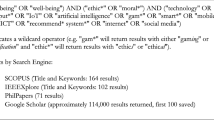Abstract
The design of Web browsers has resulted in a transfer of power to Web users and developers who often lack an ethical framework in which to act. For example, the technology makes it simple to copy and use other people’s Web page formatting without their permission. The author argues that we need to educate more people about ethical Web practices, and the author asks for “rules of the road” which amateurs and professionals can understand and follow. This article discusses four areas of concern about Web development: the browser wars, information storage and retrieval, access for the handicapped, and cookies. For teachers, there are suggestions on how to use browsers to help students learn about Web ethics.
Similar content being viewed by others
References
S. Adams, S. (1996) The Dilbert Principle, Harper Business, NY, p. 324.
Cerf, V. (1989) Communications of the ACM 32 (4): 710.
Schneiderman, R.A. (April 1997) A Non-Librarian Explains “Why Librarians Should Rule the Net”, Information Outlook, p. 35.
Woodbury, M. (1995) The Net and National Identity: Freedom and Cooperation, or Fragmentation and Chaos, Proceedings of the 16th National Online Meeting, Ed: Williams, M. ISBN 1-57387-004-8, Information Today, Inc., New York.
Johnson, D.G. (1990) Computer Ethics, Prentice Hall, Englewood Cliffs, NJ.
Holloway, M. (December 1997) Molding the Web, Scientific American, http://www.sciam.com/1297issue/1297profile.html.
Schneiderman, R.A. (April 1997) p. 34.
Cook, R. (August 1996) Web Design For Everyone, NetscapeWorld, http://www.netscapeworld.com/netscapeworld/nw-08-1996/nw-08-bestpract.html.
Shneiderman, B. (October 1990) Human Values and the Future of Technology: A Declaration of Empowerment. Computers & Society 20 (3): 1–6.
Bush/NARA FOIA Case: Argument and Court Decision, http://www.cpsr.org/cpsr/foia/PROFS_CASE/profs.html.
Bakker, W. & Loui, M.C. (1997) Can Designing and Selling Low-Quality Products Be Ethical?, Science and Engineering Ethics 3: 161.
Schneiderman, R.A. (April 1997) pp. 34–35.
Bakker and Loui; Martin, C.D. (1997) What is Computer Ethics?, inroads, the SIGSCE Bulletin 29 (4): 8–9.
Schneiderman, B. (October 1990) Computers & Society 20 (3): 1–6.
Author information
Authors and Affiliations
Additional information
“We are all idiots and we are going to make mistakes.” Scott Adams
Rights and permissions
About this article
Cite this article
Woodbury, M. Defining web ethics. SCI ENG ETHICS 4, 203–212 (1998). https://doi.org/10.1007/s11948-998-0050-x
Received:
Revised:
Accepted:
Issue Date:
DOI: https://doi.org/10.1007/s11948-998-0050-x




